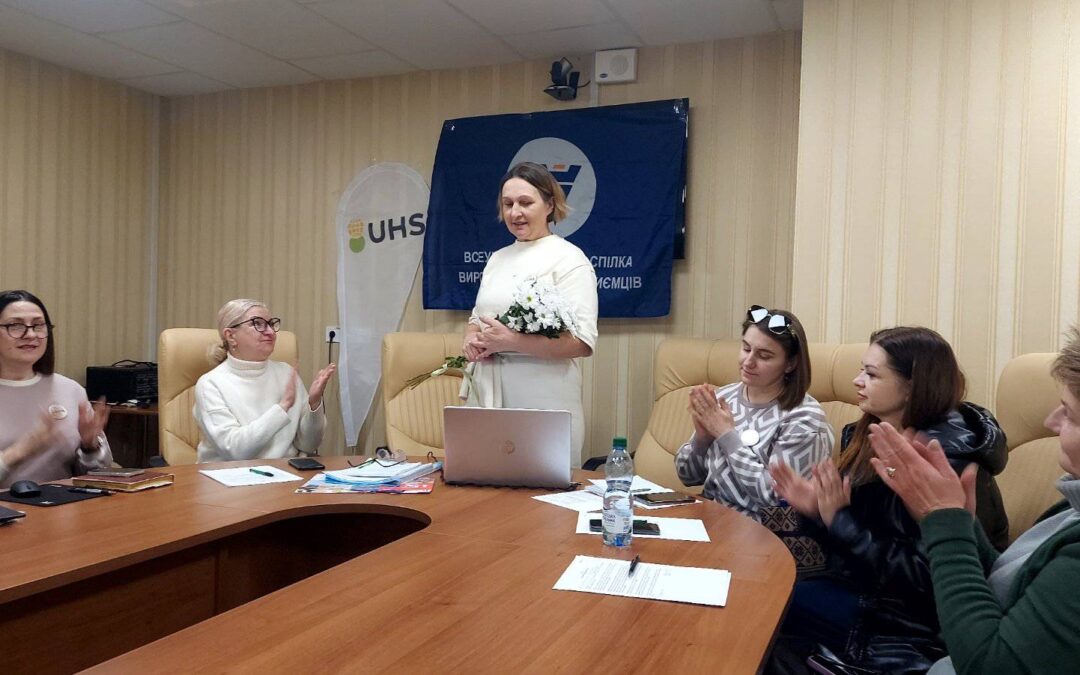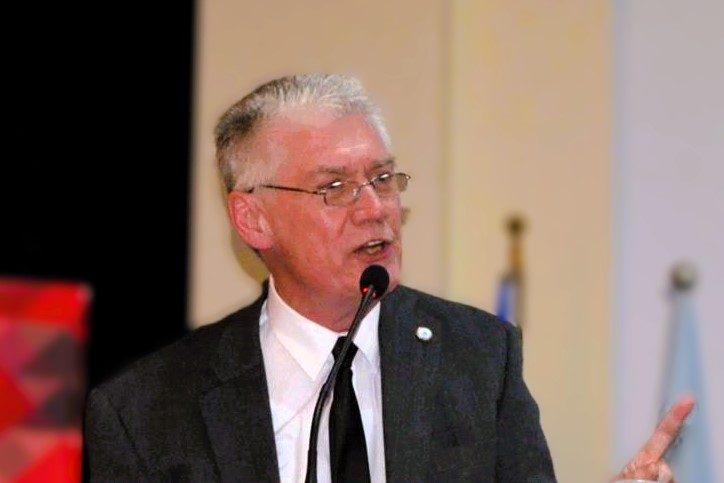
May 31, 2024
Built on research commissioned by the Solidarity Center, the Nigeria Labor Congress (NLC) and Trade Union Congress (TUC) in May launched a heat stress campaign with other civil society groups and government in Abuja to address the impact of worsening heat on Nigeria’s working people—especially those who earn their living outdoors, such as on construction sites or in agricultural or oil fields.
“The campaign is key to promoting environmental justice, occupational health and safety, and a safe working environment for Nigerian workers and Nigerians in general,” said NLC Senior Assistant General Secretary Eustace James.
A lethal heat wave that overwhelmed hospitals and mortuaries in some parts of West Africa last month is a warning of similar events to come with increasing frequency, predicts international climate scientist network World Weather Attribution (WWA).
The “Stop the Heat Stress” climate justice campaign features data collection through sector-union surveys as well as street rallies and visits to state legislators and administrators to raise awareness of the impact of climate change on worker health and safety.
A key preliminary finding of the unions’ climate impact research is the worrying impact of heat stress on workers’ mental health. Prolonged exposure to high temperatures at work reduces productivity and increases the risk of injury, disease and death, reports the International Labor Organization (ILO), which is recommending employer and government mitigation measures. Indeed, an intense heatwave in April likely killed “hundreds or thousands of people” across West Africa. And the summer of 2023 recorded some of the highest temperatures on record for the entire planet, having significant consequences for human life, including in the world of work, warned the ILO.
To ensure that climate-related legislation and policies prioritize worker health and safety and their economic survival, the union campaign is partnering with Nigeria’s Environment and Labor Ministries, governmental bodies involved in environmental efforts, including Nigeria’s National Council on Climate Change (NCCC), and environmental civil society organizations.
The Nigeria Labor Congress (NLC), one of the country’s two labor federations, continues to call for the immediate inclusion of workers and their unions in the governing structures of the NCCC—in part to protect those working in the agricultural sector, where almost half of all job losses are expected to occur. New climate policies—whether designed to mitigate or respond to worsening impacts—will inevitably impact working people. To ensure that these policies protect and build resilience for workers and their communities, unions must be meaningfully included in their development.
“The grim reality that 81.4 percent of Nigerian workers lack insurance against potential job losses brings to the fore our demand for social protection to protect vulnerable workers,” said the NLC’s Uche Ekwe, representing NLC General Secretary Emma Ugboaja.
The NLC and TUC are umbrella unions that together represent millions of workers in Africa’s most populous nation. Nigeria’s poverty rate was estimated to have reached almost 40 percent in 2023, with an estimated 87 million Nigerians living below the poverty line, the world’s second-largest poor population after India.
“[There must be] intensity in ensuring safety and climate justice for all,” said James.

May 24, 2024
Soon after organizing to advocate for formal recognition as workers and protections at work, domestic workers in Ukraine won a significant victory when President Volodymyr Zelenskyy signed a new law on May 22 regulating domestic work and affording new protections to domestic workers.
Significantly, the law recognizes and defines domestic work and domestic workers, and affords them all labor rights and guarantees, including normal working hours, overtime compensation, daily and weekly rest periods, and paid annual leave. It guarantees domestic workers’ right to a safe and healthy work environment and makes employers responsible for ensuring safe working conditions. The law also establishes an employment contract as the primary means of formalizing the working relationship and sets a minimum age for domestic workers.
Last year, the first survey to evaluate the working conditions of Ukraine’s domestic workers found that lacking contracts and formal recognition left most respondents vulnerable to low pay, wage theft, confusion about employment status, exclusion from the country’s pension system and minimal capacity to exercise their right to freedom of association. Most reported working without formal terms and conditions of employment.
“This is an important development for Ukraine’s human rights protection and Euro-integration efforts,” said Tristan Masat, Solidarity Center Ukraine country program director. “Domestic and care workers are among the most isolated and vulnerable groups in the economy, and with so many Ukrainians working in-household jobs in the EU, it’s valuable to see the government take a strong and progressive position on the rights of these workers in Ukraine.”

Tetiana Lauhina, founder of the Union of Home Staff
While the new law allows domestic workers and employers to codify the terms of employment in a contract and protects domestic workers under Ukraine’s labor laws, much work remains to enforce the law and secure better protections for domestic workers.
Tetiana Lauhina, founder of the Union of Home Staff, said the law has been a long time in coming. “We have been waiting for this law since 2015. It’s a strong step in the right direction. Next, we’d like to see the International Labor Organization’s Convention 189 on domestic workers ratified by Ukraine. Its ratification and implementation is a major goal for the Union of Home Staff.”

May 7, 2024
Garment workers in Cebu province’s economic processing zones face an uphill battle in their fight for better working conditions as their factories push back using anti-union tactics, including the firing of union leaders.
Globalwear Manufacturing, Inc., terminated Alan Esponga, Association of Globalwear Employees’ Union PIGLAS (AGSEU-PIGLAS) president, citing excessive absences. Esponga says he was denied leave during a personal emergency to create an excuse to dismiss him.
AGSEU-PIGLAS and its sister union, Globalwear Employees’ Union PIGLAS (GEU-PIGLAS), represent over 2,000 workers manufacturing for brands like Nike and Under Armour.During two certification elections, management also used unfair tactics to try to sway the vote against the union, including offering financial incentives to vote against the union and threatening factory closure if the unions won.
The overt attempts to undermine union organizing and bargaining create fear among the workforce., Victorio Evaribto, union president at Vertex1 Apparel Phils., Inc., another Under Armour supplier, says, “Our young workforce, many of whom support families back home, fear losing their jobs if they join the union.”
Evaribto says the company’s human resources department has discouraged new employees from joining a union, warning them against exercising their right to freedom of association.
However, union leaders remain hopeful in the thick of challenges and persistent in inviting co-workers to orientations on the benefits of unionization.
“We want to dispel the myth that unions are bad or illegal,” said Lucil, president of a budding union at another garment factory in Cebu, emphasizing the goal of creating a more balanced relationship between management and workers.
“Understanding our rights empowers us to fight for them,” added Erlinda Bardenas, GEU-PIGLAS president. “Together, through our union, we can achieve this.”

May 6, 2024
More than 200 Filipino app-based delivery riders banded in a unity ride around Cebu province in late April, protesting 150M pesos (approximately $2.6 million) in wage theft.
Riders from Cebu filed a case against the multinational delivery app, Grab, in March, citing reductions in benefits and pay for deliveries due to “double bookings,” when a rider picks up more than one order but is only credited for a single delivery.
“Grab isn’t paying the proper income they rightfully owe us. This is wage theft,” said Naohde Vayson, National Union of Food Delivery Riders (RIDERS-SENTRO) Cebu president. “We’re fighting for respect and decent jobs.”
RIDERS-SENTRO launched its seventh chapter in the province in April. Nationwide, its members are working to be recognized and negotiate with Grab and other multinational delivery app companies for decent wages and benefits.
Many delivery and ride-hailing companies continue to use “partnership” agreements as a loophole to avoid providing comprehensive social insurance and benefits to its workers.
As one of the largest chapters of RIDERS-SENTRO in the Philippines, Vayson said they aim to grow membership. The union’s subchapter for riders delivering for Foodpanda, another multinational delivery platform, is expected to launch later this year.
“We continue to encourage more riders to join our union for a stronger voice against Grab’s unfair practices,” Vayson added.

Apr 25, 2024
The global labor movement lost a friend and advocate, and the Solidarity Center a dear colleague with the passing of Laurence “Laurie” Clements on April 19 after a lengthy and courageous battle with cancer. Laurie is survived by his wife, Inja, a son, two daughters and two step-daughters.
Before Laurie’s impactful tenure at the Solidarity Center, he was a respected figure in the academic and union spheres. Starting his career at the University of Iowa Labor Center in 1984, he rose to director in 1994. Simultaneously, he served as president of the American Federation of Teachers local union and secretary-treasurer of the Iowa State Federation of Teachers. He further honed his expertise and leadership by facilitating training programs, seminars and workshops in several Balkan countries from 1996 to 2000.
Laurie joined the Solidarity Center in 2001 as country program director in Serbia. His dedication and passion for our mission took him to the Middle East and North Africa region in 2005, where he ran programs in Iraq, Kuwait and Lebanon. His leadership and invaluable contributions to our work, which we remember with deep gratitude, are a testament to his unwavering commitment.
Those fortunate enough to have attended Laurie’s training programs were witness to his unique ability to connect with participants. Our union partners, in particular, who engaged in his inspiring and thought-provoking sessions, left with a renewed sense of commitment to building union strength and solidarity.
Laurie’s fervor for organizing to advance worker rights was not just a professional pursuit but a deeply personal one. It was ignited at a young age when he witnessed the plight of workers in his neighborhood, who often suffered from work-related injuries and deaths at the docks and shipyards in his hometown of Cardiff, Wales. This early experience instilled in him a profound commitment to occupational safety and health protections.
In his recently published autobiography, “A Poem on Life,” he wrote about his childhood growing up in a government-owned “council house” with his family of five, witnessing the solidarity of the working people in his neighborhood and the power of unions to improve their lives.
“These were families who had a strong understanding of collective action,” he wrote, “and they understood the bonds of solidarity that were expressed in the industrial action of the trade union movement. The improvements in their lives had come primarily from unionization.”
Laurie Clements was a great trade unionist and a wonderful person. It was a privilege to work alongside him and call him a colleague, friend, and brother.

Apr 19, 2024
A regional health care rights campaign led by the Organization of Trade Unions of West Africa (OTUWA) saw some success in Nigeria this month, where the federal government announced a disbursement of almost $70 million to bolster the country’s health infrastructure.
The funds will be delivered through the country’s Basic Health Care Provision Fund, which delivers essential but often out-of-reach health care service to Nigeria’s citizens—more than 90 percent of whom work uncertain, poorly paid informal jobs.
“We celebrate with our Nigerian partners and will continue to support unions that are demanding more investment by governments in the health of their citizens,” says Solidarity Center Africa Regional Program Director Christopher Johnson.
In Nigeria, where out-of-pocket health care payments were reportedly among the highest in the world in 2023, the campaign is supported by the International Federation of Women Lawyers (FIDA), the Medical and Health Workers Union of Nigeria (MHWUN), the National Association of Nigeria Nurses and Midwives (NANNM) and labor federations Nigeria Labor Congress (NLC) and Trade Union Congress of Nigeria (TUC).
In the region, OTUWA’s “Health Care Is a Human Right” campaign is supported by OTUWA’s affiliates together with many of their health-sector unions. A 2020 survey of 700 health workers living in Gambia, Ghana, Nigeria, Senegal, Sierra Leone and Togo provides a window into the region’s health-sector shortcomings and presents a raft of recommendations for ensuring the protection of health worker rights and effective, accessible health care for all.
OTUWA’s “Health Care Is a Human Right” campaign, launched in Abuja in March 2020, unites OTUWA affiliates in a fight for equal and fair health care access for all who live within the ECOWAS region. The campaign includes collection of health data and advocacy with national and continent-wide African Union legislators and policymakers.
The region’s signatory governments are required by ECOWAS Fundamental Principles to promote and protect human rights in accordance with the African Union (AU) Charter on Human and Peoples’ Rights—including provision of social protections such as health care.
Like many other African countries, Nigeria’s government is struggling to provide essential services to its citizens in the context of mounting national debt and illicit financial flows. Curbing multinational tax dodging, government corruption and other criminal activity is essential, say unions, because doing so could cut by almost half the $200 billion annual financing gap for achieving the UN Sustainable Development Goals, according to the UN Conference on Trade and Development (UNCTAD). The 2023 SDG report noted that 381 million people, or almost 5 percent of the world’s population, were pushed into extreme poverty in 2019 by out-of-pocket health expenditures.
OTUWA represents trade union national centers in the 15 West African countries comprising the Economic Community of West African States (ECOWAS).







